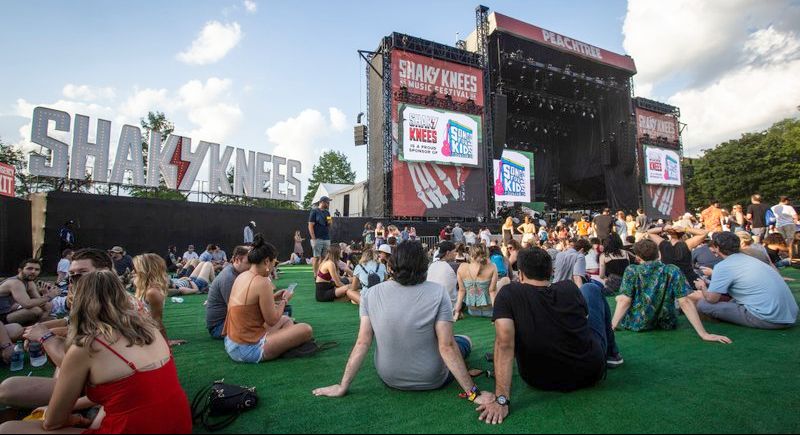Live Nation est aussi propriétaire d’evenko à 49% depuis quelques mois. Dans son mémo, le promoteur demande plusieurs changements dans les façons de faire de l’industrie événementielle. Ceci est dans le but d’avoir un avenir viable pour les salles de spectacle et les festivals que possèdent Live Nation et sa compagnie de billetterie Ticketmaster.
L’un de ces changements est une diminution de 20% du cachet des artistes selon les prix qui étaient établis en 2020. Cela veut donc dire que si Post Malone chargeait 800 000$ pour une performance en festival en 2020, il serait payé 640 000$ en 2021.
Ceci est le point le plus important et le plus intéressant. C’est peut-être aussi ce qui explique que plusieurs festivals majeurs n’ont pas encore reconfirmé d’artistes pour 2021. Les contrats devront être renégociés, peut-être à la baisse, pour arriver avec un équilibre et un risque calculé pour les festivals en 2021.
Le Festival d’été de Québec et Osheaga n’ont d’ailleurs pas annoncé de groupe pour 2021. Le Bluesfest, qui se tient pourtant pendant les mêmes dates du FEQ en 2021, a confirmé Rage Against The Machine, Marshmello, Jack Johnson, Alanis Morrissette et plus. Est-ce que le FEQ et Osheaga seraient en train de renégocier les cachets des artistes ainsi que les clauses dans les contrats? Peut-être. C’est ce que Live Nation essayera de faire, du moins.
Les autres points de la note envoyée par Live Nation mentionnent que les artistes seront payés 25% du cachet si un concert ou une tournée doit être annulé en raison de mauvaises ventes des billets. Auparavant, l’artiste touchait 100% de la garantie du cachet et le promoteur assumait la perte. Le risque serait maintenant séparé entre le groupe et le promoteur.
Il est aussi mention que les déplacements et l’hébergement seront à la charge des artistes. C’est généralement le cas lors de tournée en salle, mais le contraire en festival. Les groupes étaient pris en charge par les festivals au niveau de leur hébergement et transport.
La note complète de Live Nation est ci-dessous. C’est plus deep dans l’industrie du concert et du festival, mais c’est intéressant pour comprendre la position des gros joueurs concernant le futur des événements.
Live Nation Memo to Talent Agencies
The global pandemic has changed the world in recent months and with it the dynamics of the music industry. We are in unprecedented times and must adequately account for the shift in market demand, the exponential rise of certain costs and the overall increase of uncertainty that materially affects our mission. In order for us to move forward, we must make certain changes to our agreements with the artists. The principle changes for 2021 are outlined below.
Artist Guarantees: Artist guarantees will be adjusted downward 20% from 2020 levels.
Ticket Prices: Ticket prices are set by the promoter, at the promoter’s sole discretion, and are subject to change.
Payment Terms: Artists will receive a deposit of 10% one month before the festival, contingent on an executed agreement and fulfillment of marketing responsibilities. The balance, minus standard deductions for taxes and production costs, will be paid after the performance.
Minimum Marketing Requirements: All artists will be required to assist in marketing of the festival through minimum social media posting requirements outlined in artist offer.
Streaming requirements: All artists will be required to allow their performance to be filmed by the festival for use in a live television broadcast, a live webcast, on-demand streaming, and/or live satellite radio broadcast.
Billing: All decisions regarding “festival billing” are at the sole discretion of the promoter.
Merchandise: Purchaser will retain 30 % of Artist merchandise sales and send 70% to the artist within two weeks following the Festival.
Airfare and Accommodations: These expenses will be the responsibility of the artist.
Sponsorship: The promoter controls all sponsorship at the festival without any restrictions, and artists may not promote brands onstage or in its productions.
Radius Clause. Violation of a radius clause without the festival’s prior authorization in writing will, at the festival’s sole discretion, result in either a reduction of the artist fee or the removal of the artist from the event, with any pre-event deposits returned to the festival immediately.
Insurance: The artist is required to maintain its own cancellation insurance as the promoter is not responsible for the artist fee in the event of a cancellation of the festival due to weather or a force majeure.
Cancellation by Artist: If an artist cancels its performance in breach of the agreement, the artist will pay the promoter two times the artist’s fee.
Cancellation Due to Poor Sales. If a show is cancelled due to poor ticket sales, the artist will receive 25% of the guarantee.
Force Majeure: If the artist’s performance is canceled due to an event of force majeure – including a pandemic similar to Covid-19 – the promoter will not pay the artist its fee. The artist is responsible for obtaining any cancellation insurance for its performance.
Inability to Use Full Capacity of the Venue: If the promoter – either because of orders of the venue or any governmental entity – is not permitted to use the full capacity of the venue, then the promoter may terminate the agreement, and artist will refund any money previously paid.
We are fully aware of the significance of these changes, and we did not make these changes without serious consideration. We appreciate you – and all artists – understanding the need for us to make these changes in order to allow the festival business to continue not only for the artists and the producers, but also for the fans.
*
Pendant ce temps, le gouvernement du Québec veut augmenter la capacité dans les salles de spectacle à 250 personnes dès le 15 juillet 2020.
[Via Rolling Stone]


